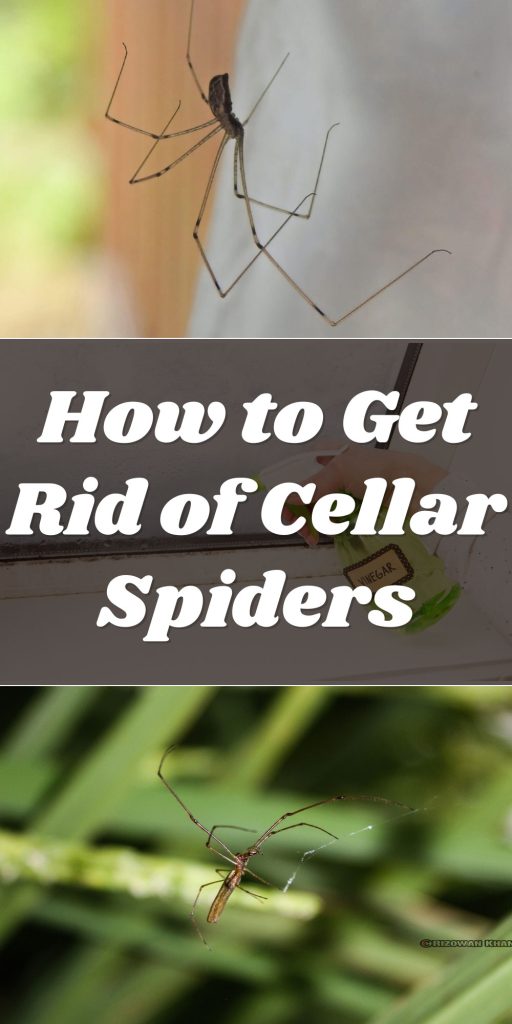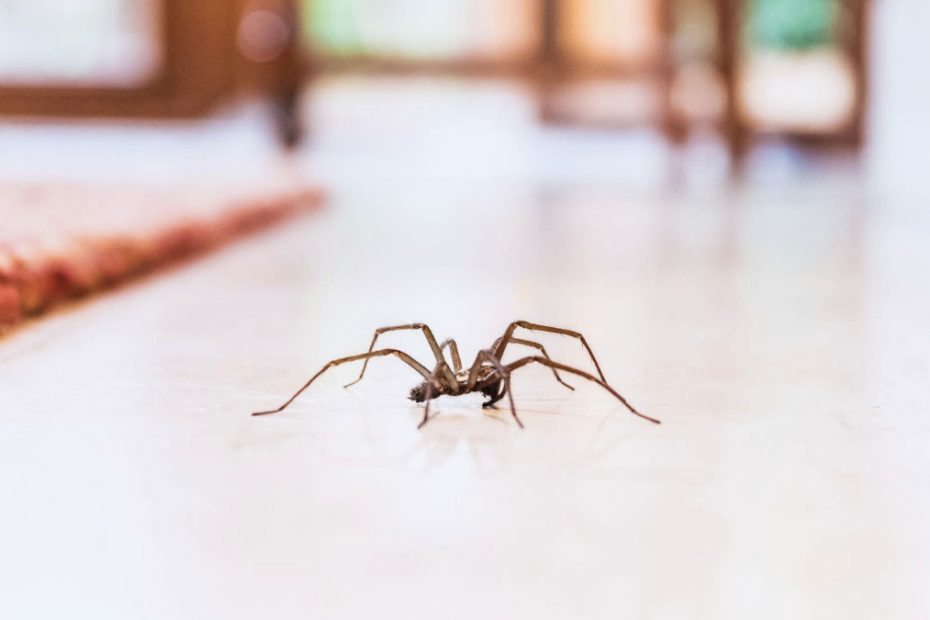Cellar spiders, often known as “daddy long-legs,” can turn your cozy basement into an unsettling space. These long-legged arachnids thrive in dark, damp environments, making cellars and basements their favorite hideouts. While they’re generally harmless to humans, their presence can be quite unsettling.
If you’re tired of seeing these eight-legged visitors, it’s time to take action. Understanding why cellar spiders invade your home and learning effective ways to get rid of them can help you reclaim your space. Whether you’re looking for natural remedies or professional solutions, we’ve got you covered.
Key Takeaways
- Identify Cellar Spiders: Recognize cellar spiders by their long legs, small body, light brown color, and irregular webs in dark, damp areas like basements and crawl spaces.
- Prevention Measures: Seal entry points, reduce moisture levels, and maintain regular cleaning to prevent cellar spider infestations. Use weatherstripping, dehumidifiers, and exhaust fans where necessary.
- Natural Remedies: Essential oils (like peppermint and tea tree oil), vinegar solutions, and diatomaceous earth are effective, non-toxic ways to deter and eliminate cellar spiders.
- Chemical Solutions: Utilize insecticidal sprays for immediate results or hire professional extermination services for severe infestations to ensure thorough treatment.
- Long-term Maintenance: Conduct routine inspections, seal entry points, reduce home moisture, clean regularly, and store items in sealed containers to keep cellar spiders at bay.

Understanding Cellar Spiders
Cellar spiders, often known as “daddy long-legs,” are a common presence in many homes. While their appearance can be off-putting, understanding their characteristics and behaviors helps in managing their presence effectively.
Identifying Cellar Spiders
You can recognize cellar spiders by their distinct features:
- Long, Thin Legs: Their legs are many times the length of their small body.
- Small Body: The body size is typically around 2-10 mm.
- Light Brown Color: Most cellar spiders are light brown or gray.
- Webbing: They create irregular, loose webs in corners.
Habitat and Behavior
Cellar spiders prefer specific environments and exhibit unique behaviors:
- Preferred Habitats:
- Dark Areas: They thrive in basements, crawl spaces, and cellars.
- Damp Spaces: Increased humidity levels attract them.
- Undisturbed Corners: Their webs are often found in undisturbed, quiet areas.
- Typical Behavior:
- Web Building: They construct irregular webs to catch prey.
- Feeding Habits: They feed on small insects and other spiders.
- Reproduction: Females lay eggs in silk sacs suspended in the web.
- Movement: They move with a distinctive bouncing or vibrating motion when disturbed.
Understanding these habits helps in planning effective removal and prevention strategies for cellar spiders.
Prevention Measures
To keep cellar spiders at bay, it’s crucial to adopt effective prevention measures. Implementing these strategies helps maintain a spider-free home environment.
Sealing Entry Points
Blocking access points prevents cellar spiders from entering your home.
- Inspect Windows and Doors: Check for gaps around windows and doors. Use weatherstripping for a secure seal.
- Repair Cracks: Examine walls and foundations for cracks. Apply caulk or sealant to close them.
- Screen Vents: Ensure all vents have intact screens. Replace any damaged ones.
Reducing Moisture Levels
Cellar spiders thrive in damp environments. Lowering moisture levels in your home discourages their presence.
- Use Dehumidifiers: Place dehumidifiers in areas like basements and crawl spaces. Maintain humidity levels below 50%.
- Fix Leaks: Address any leaks in plumbing or roofing. Promptly repair leaking pipes or roof cracks.
- Improve Ventilation: Ensure proper ventilation in attics and basements. Install exhaust fans if necessary.
Regular Cleaning
Keeping a clean home reduces the likelihood of spider infestations.
- Clear Clutter: Remove clutter from storage areas. Use plastic containers instead of cardboard boxes.
- Vacuum Frequently: Vacuum regularly, especially in corners and behind furniture. Pay attention to dark, undisturbed areas.
- Dust Surfaces: Dust shelves, window sills, and wall corners. Use a damp cloth or a vacuum attachment for thorough cleaning.
By implementing these measures, you can significantly reduce the chances of cellar spiders invading your home.
Natural Remedies
Natural remedies offer effective solutions to get rid of cellar spiders without using harmful chemicals. These methods can be safer for pets and children while still ensuring your home remains spider-free.
Essential Oils
Essential oils can be used to deter cellar spiders. Certain oils have strong scents that spiders find unbearable.
- Peppermint Oil: Dilute 10-15 drops of peppermint oil in a spray bottle filled with water. Spray the mixture around windows, doors, and other entry points.
- Tea Tree Oil: Like peppermint oil, tea tree oil works well as a repellent. Mix a few drops with water and spray in corners, basements, and dark areas.
- Lavender Oil: This oil not only repels spiders but also adds a pleasant fragrance to your home. Mix 10 drops with water and use it as a spray.
Essential oils are natural, cost-effective, and pleasant-smelling alternatives to commercial sprays.
Vinegar Solutions
Vinegar is a powerful natural remedy for getting rid of cellar spiders. Its acidic properties are effective in deterring many pests, including spiders.
- White Vinegar Mixture: Combine equal parts white vinegar and water in a spray bottle. Spray this solution directly on spider webs, corners, and entry points.
- Surface Wipe-down: Use the vinegar-water solution to wipe down surfaces, cracks, and crevices where spiders are likely to hide.
White vinegar can disrupt spiders’ sensory receptors, making your home less inviting for them.
Diatomaceous Earth
Diatomaceous earth (DE) is a natural powder made from the fossilized remains of diatoms. It’s an effective insecticide that can help control cellar spiders.
- Usage: Sprinkle food-grade diatomaceous earth in areas where you’ve seen spiders. Focus on baseboards, corners, and dark, damp areas like basements.
- Application: Apply the DE lightly but ensure it covers all potential hiding spots. Reapply after cleaning or every few weeks to maintain effectiveness.
Diatomaceous earth works by dehydrating spiders when they come into contact with the powder, providing a non-toxic way to eliminate these pests.
By utilizing essential oils, vinegar solutions, and diatomaceous earth, you can effectively reduce or eliminate cellar spiders in your home. These natural remedies are easy to carry out and provide a safer alternative to chemical treatments.
Chemical Solutions
Chemical solutions offer another effective approach to eliminating cellar spiders. These methods often provide quick and reliable results, making them a popular choice among homeowners.
Insecticidal Sprays
Using insecticidal sprays can help you swiftly deal with cellar spiders. These products contain active ingredients designed to kill spiders on contact or affect their nervous systems to ensure elimination.
Key Types of Insecticidal Sprays:
- Contact Sprays: Kill spiders immediately upon contact, ideal for visible infestations.
- Residual Sprays: Provide prolonged protection by leaving a chemical barrier that continues to work for several weeks.
Applying Insecticidal Sprays:
- Identify Target Areas: Focus on locations like corners, crevices, and behind furniture where spiders are likely to hide.
- Spray Strategically: Apply the solution in a sweeping motion to ensure thorough coverage of the targeted area.
- Ventilate: Ensure the area is well-ventilated during and after application to avoid inhaling fumes.
Professional Extermination
If dealing with a severe infestation, professional extermination services can offer a comprehensive solution. Pest control experts use advanced methods and chemicals that are not readily available to the general public.
Benefits of Professional Extermination:
- Expert Knowledge: Technicians possess extensive training and experience, allowing for accurate identification of the problem and effective treatment plans.
- Stronger Chemicals: Access to professional-grade chemicals ensures more potent and long-lasting results.
- Ongoing Monitoring: Many services include follow-up visits to monitor the situation and apply additional treatments if necessary.
- Research: Look for certified pest control companies with positive reviews and proven track records.
- Consultation: Schedule a consultation to discuss the specific issue and receive an estimate.
- Contract Review: Carefully review the service contract, understanding all aspects of the treatment plan and costs involved.
By using these chemical solutions, you can effectively manage and eliminate cellar spider infestations, ensuring your home remains spider-free.
Long-term Maintenance
To ensure cellar spiders don’t return, you must adopt long-term maintenance strategies. These actions help maintain an environment that is less welcoming to cellar spiders.
Routine Inspections
Conduct regular inspections to identify potential spider habitats. This includes checking:
- Basements and attics for spider webs and dark corners.
- Foundation cracks and window seals for gaps.
- Vents and pipes for potential entry points.
Catch issues early to prevent more significant infestations.
Ongoing Preventative Actions
Carry out ongoing measures to keep spiders at bay. Key actions include:
- Sealing Entry Points: Inspect doors, windows, and walls regularly. Use weather stripping or caulking to close any gaps.
- Reducing Moisture: Keep your home dry using dehumidifiers, and fix any leaks immediately.
- Regular Cleaning: Vacuum often, especially in dark corners and beneath furniture. Dust surfaces and clear clutter frequently.
- Storing Items Properly: Use sealed containers for storage, especially in basements and attics.
- Using Natural Repellents: Continue applying essential oils or vinegar solutions to potential entry points.
By making these actions part of your routine, your home remains unattractive to cellar spiders.
Conclusion
By understanding the habits and habitats of cellar spiders, you’re better equipped to manage and prevent infestations. Adopting a combination of natural remedies and chemical solutions can help you eliminate these pests effectively. Remember to seal entry points, reduce moisture levels, and maintain regular cleaning routines to keep your home uninviting to spiders. For severe cases, professional extermination services can provide a more comprehensive solution. With these strategies in place, you can reclaim your living spaces and enjoy a spider-free home.
Frequently Asked Questions
What are cellar spiders?
Cellar spiders, commonly known as “daddy long-legs,” have long, thin legs, small body sizes, light brown color, and irregular webbing. They prefer dark, damp, and undisturbed areas, like basements.
Are cellar spiders harmful?
No, cellar spiders are generally harmless to humans. However, their presence can be unsettling for homeowners.
How can I prevent cellar spiders from entering my home?
Seal entry points by inspecting and repairing gaps in windows, doors, walls, and foundations. Use dehumidifiers, fix leaks, and improve ventilation to reduce moisture levels. Regular cleaning, including vacuuming and dusting, is also essential.
What natural remedies can I use to deter cellar spiders?
Use essential oils like peppermint, tea tree, and lavender by diluting and spraying them around entry points. Vinegar solutions and diatomaceous earth (DE) are also effective natural remedies.
Which chemical solutions are effective for eliminating cellar spiders?
Insecticidal sprays, including contact sprays for immediate results and residual sprays for prolonged protection, are effective. Ensure proper ventilation during and after application.
When should I consider professional extermination services?
Consider professional extermination for severe infestations. Experts offer stronger chemicals, expert knowledge, and ongoing monitoring for effective spider control.
How can I maintain a spider-free home in the long term?
Conduct routine inspections of potential spider habitats. Continue sealing entry points, reducing moisture, regular cleaning, and using natural repellents. Incorporate these actions into your routine to effectively manage and prevent infestations.
